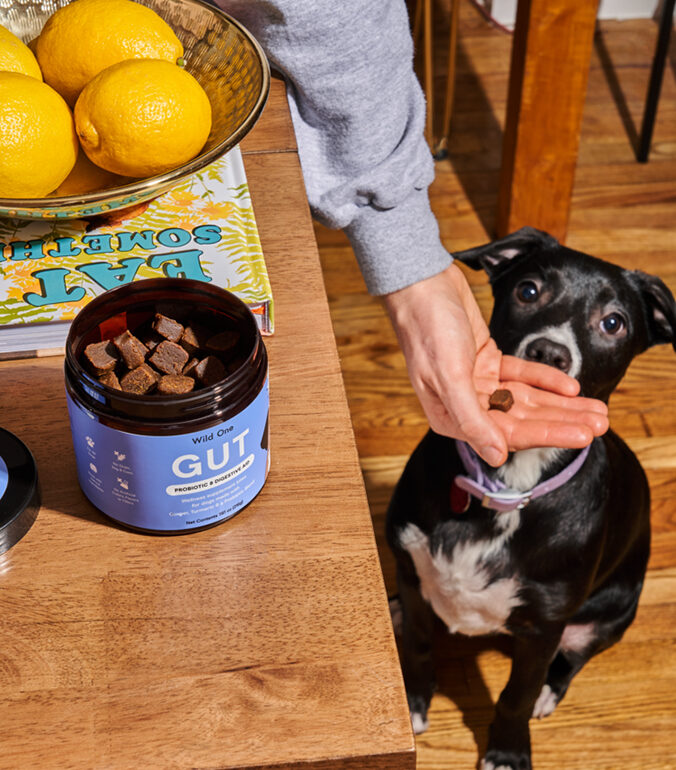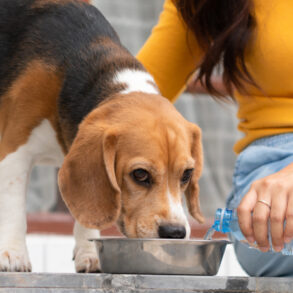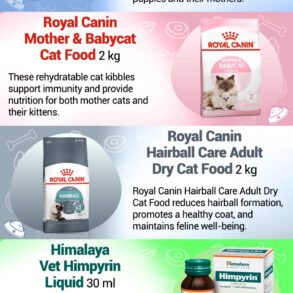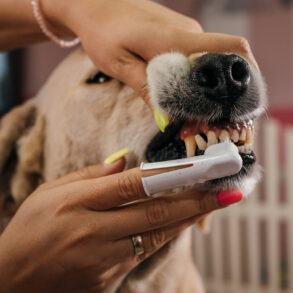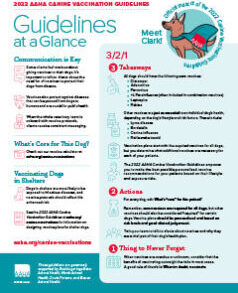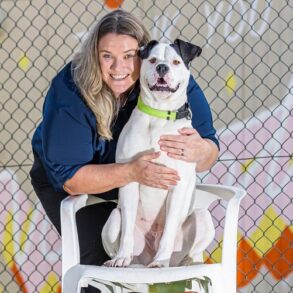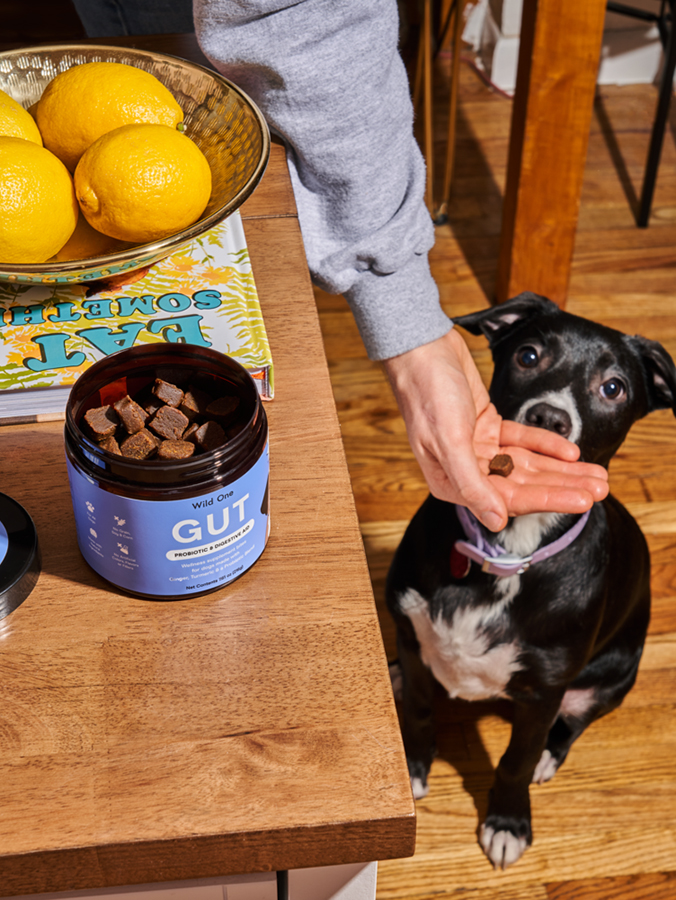
If your supplement supply reflects the health trends of the past few years, there’s a solid chance you have a few probiotics included in there. Maybe you were drawn in by the promises on the packaging, maybe a particular brand was served to you by the Instagram algorithm, or maybe your doctor told you this was the next best thing for your health.
Whatever your gateway into probiotics, you may still not fully grasp what the microorganisms that comprise the genre actually are or do — and you also may not know that dogs can also benefit from probioticsopens in a new tab. The Wildest reached out to experts to get to the bottom of what probiotics are and why your dog may need themopens in a new tab in their own pantry.
What are probiotics for dogs?
What exactly are dog probiotics, anyway? According to Mary Ellen Sanders, PhD, an internationally recognized leader in probiotic microbiology, in the canine gastrointestinal (GI) tract, probiotics promote health by “piggybacking on the important relationship between the normal immune system and microbes.”
When the immune system senses these microbes in the gut, it launches a response to protect the body. In layman’s terms: Probiotics effect bodily functions ranging from digestionopens in a new tab to immune health and can even influence moodopens in a new tab.
Dr. Robert Boyle, a clinical lecturer with the U.K.’s National Institute for Health Research, recommends taking a preventative approach in order to optimize the use of canine probiotics. “Once disease is established, it is harder for [probiotics] to compete with pathogenic bacteria and processes that have already become established in the gut,” Dr. Boyle says. Not only do probiotics keep your dog’s gut microorganisms balanced, they also boost digestion, energy levels, and metabolism, as well as aid their natural immune defenses. That’s why it’s so important to start your dog on a diet rich in good microflora while they’re in good health.
What are the benefits of canine probiotics?
Probiotics for dogs can prevent or alleviate conditions such as diarrhea, constipation, and irritable bowel syndrome (IBS), says Dr. Athena Gaffud, a veterinarian with Veterinarians.org.
“The potential benefits of probiotics for dogs include maintaining a healthy balance of good bacteria in the digestive tract and aiding in the digestion and absorption of nutrients,” Gaffud says. “The gut microbiome plays a crucial role in a dog’s overall wellbeing, and probiotics are live microorganisms that can provide positive effects when administered in adequate amounts.”
She adds that probiotics for dogs with allergies can work wonders, too, due to their effect on the immune system. “Probiotics can enhance the immune response by promoting the growth of beneficial bacteria and crowding out harmful pathogens,” Gaffud says. “They may also contribute to a reduction in allergic reactions and managing inflammatory conditions, such as inflammatory bowel diseaseopens in a new tab (IBD), by modulating the immune system response. This can be particularly beneficial for dogs with food allergies or sensitivities.”
Has your dog been sick and needed an antibiotic recently? “Probiotics can help replenish the beneficial bacteria that may be depleted during antibiotic treatment,” Gaffud says. And they may help with your pup’s behavior, as well. “Some studies also suggest that probiotics may positively impact behavior and stress levels in dogs. A healthy gut-brain axis is crucial for overall wellbeing, and probiotics may play a role in this connection.”
What are the potential risks of canine probiotics?
“Probiotics for dogs are generally considered safe, and side effects are rare,” Gaffud says. “However, individual dogs may react differently to probiotic supplementation.” She lists gastrointestinal upset such as diarrhea or constipation, allergic reactions, increased thirst or urination due to the specific ingredients in the supplement, or changes in the dog’s gut environment as potential side effects to watch for.
Gaffud also warns that probiotics may interfere with certain medications, particularly antibiotics. “It’s essential to consult with a veterinarian before administering probiotics if the dog is taking any medications to ensure there are no potential conflicts.”
Signs your dog needs probiotics may include things like chronic diarrhea and other gastrointestinal issues. Check with your vet to see if probiotics might help your pup with their upset tummy.
How to choose the best probiotics for your dog
The best probiotics for your dog should be determined by their individual needs and health. Probiotic choices differ by CFUs (colony forming units), bacteria strains, prebiotics and delivery method. Always consult your vet to ensure a probiotic supplement is safe for your pup.
Below, check out seven suggested probiotics for dogs that’ll help supplement their daily diet.
Btw, our editors (and their pets) picked out these products. They’re always in stock at the time we publish, but there’s a chance they’ll sell out. If you do buy through our links, we may earn a commission. (We’ve got a lot of toys to buy over here, you know?)
Best probiotics by strains of bacteria
“Different probiotic strains can have varying effects on health, and certain strains may be more beneficial for specific health conditions,” Gaffud says. “The choice of strains can be influenced by factors such as the dog’s age, health condition, and any existing gastrointestinal issues.”
Dr. Gaffud gave us a rundown on the benefits of some common strains of bacteria:
-
Lactobacillus acidophilus is commonly found in the canine gastrointestinal tract and is associated with maintaining a balanced gut microbiome. It may be beneficial for general digestive health and immune support.
-
Bifidobacterium animalis has been studied for its potential to promote digestive health and may be beneficial in addressing conditions such as diarrhea and inflammatory bowel disease (IBD) in dogs.
-
Enterococcus faecium is often included in probiotics for dogs and may help support overall gastrointestinal health.
-
Bacillus coagulans is known for its stability, this spore-forming bacterium is sometimes used in probiotic formulations for dogs. It has been studied for its potential benefits in managing diarrhea and promoting gut health.
-
Saccharomyces boulardii is a yeast often included in probiotic supplements for dogs and may be beneficial in addressing diarrhea, particularly that associated with antibiotic use.
-
Lactobacillus reuteri has been investigated for its potential to promote gut health and may have anti-inflammatory effects. It has been studied in both humans and animals.
The dog probiotics on our list all have a combination of different bacteria strains, so your pup can get the most benefit from them. These three are good ones to try — and recommended by Dr. Gaffud.
Best Probiotics By Health Conditions
If your pup has a specific health concern, you may be looking for the best probiotics for dogs with diarrhea, or the best dog probiotics for yeast overgrowth. One of these could be just what you (er, your dog) need.
Best Probiotics By Delivery Method
Worried that giving your dog probiotics could be, well, messy? We are talking about their guts, after all — and we all know what happens in there. But don’t fear: All of the probiotics on our list are given to your dog orally. Whether they’re chews, treats, or mixed into their food, they’re easy to add to your dog’s dietopens in a new tab.
FAQs (People also ask):
We asked Dr. Gaffud to weigh in on common questions pet parents have about probiotics for dogs. Find her answers below, and remember, it’s best to consult with your veterinarian on any added probiotic before giving it to your dog.
Can dogs take human probiotics?
“While some human probiotics may be safe for dogs, it’s important to note that the bacterial strains and formulations that benefit humans might not be the best choice for dogs … It’s generally safer to choose probiotic supplements designed specifically for dogs to ensure they receive the appropriate strains and dosage.”
What are the potential side effects of canine probiotics?
“Probiotics for dogs are generally considered safe, and side effects are rare. However, individual dogs may react differently to probiotic supplementation. Some potential side effects of canine probiotics include gastrointestinal upset such as diarrhea or constipation, allergic reactions, increased thirst or urination due to the specific ingredients in the supplement, or changes in the dog’s gut environment.”
When should you give your dog probiotics?
“The timing for giving your dog probiotics can depend on various factors, including the reason for using them and your dog’s individual needs. Probiotics could be given as a daily supplement, during or after antibiotic treatment, after gastrointestinal upset, or during stressful events such as travel, changes in the environment, or visits to the veterinarian.”
References:
This post was originally published on this site be sure to check out more of their content.




